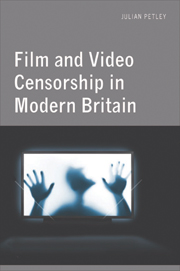Part IV - New Millennium, New Beginning?
Published online by Cambridge University Press: 05 August 2013
Summary
As we saw in Chapter 11, late in 1997 the Home Secretary, Jack Straw, imposed Andreas Whittam Smith, one of the founders and the first editor of the Independent, as the BBFC's new President. But as also noted in that chapter, if Straw thought that Whittam Smith was simply going to act as his patsy, he was very much mistaken. In January 1999, Robin Duval was appointed as the Board's Director, following a seven-year stint as deputy director of programmes at the Independent Television Commission (one of the forerunners of the present-day Ofcom). As already noted at some length, the biggest problem he had to face right away was a hang-over from the days of his predecessor James Ferman, namely the Board's apparent inability to relax the guidelines for ‘R18’ videos in the face of Home Office intransigence. At the same time, however, the Board was continuing, indeed greatly intensifying, the policy rather belatedly embarked upon by James Ferman of holding ‘roadshows’ up and down the country in order to try to gauge public opinion of the Board's standards, and, in March 2000, it went even further by organising citizens' juries in Birmingham and Portsmouth in order to gain the fullest picture to date of public attitudes to, and knowledge of, film and video classification. This entirely welcome process of glasnost was complemented by the establishment of a robust and efficient press office headed by a press officer with very considerable experience in central government.
- Type
- Chapter
- Information
- Film and Video Censorship in Modern Britain , pp. 159 - 162Publisher: Edinburgh University PressPrint publication year: 2011



